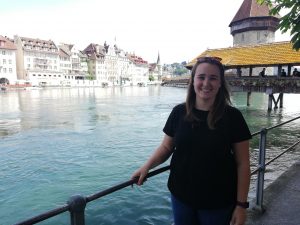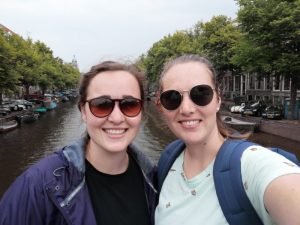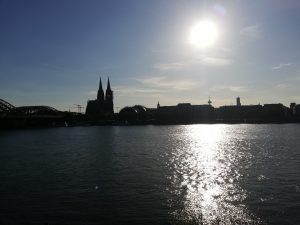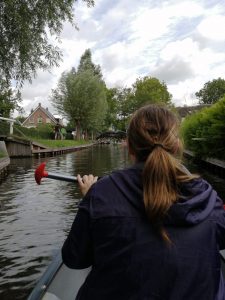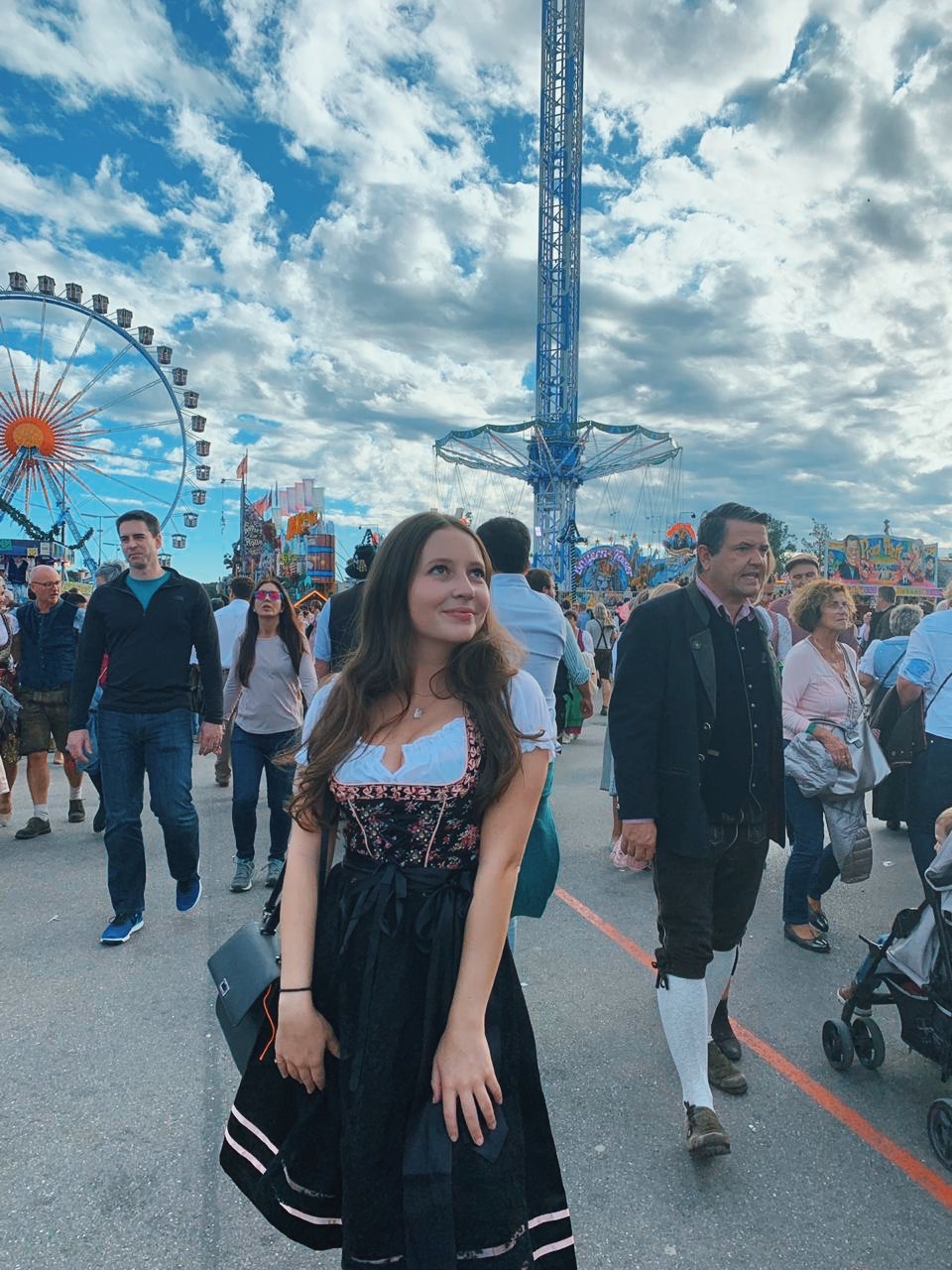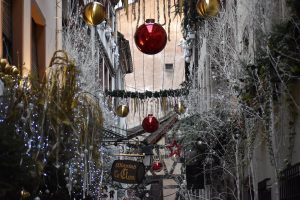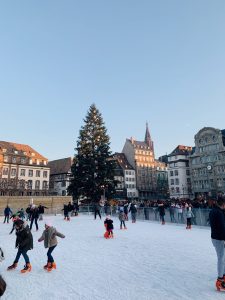Adrienne Hendricks
LLB Student
Semester Exchange in the Second Semester, 2022 at the University of Amsterdam
Pre-departure:
The pre-departure period is one of excitement, nerves, and many deadlines. I needed a new passport to fill out my applications for the University of Amsterdam. I would suggest that as soon as you know you want to apply for an exchange or go through the interview process to get one if you need to relieve the stress of having to wait for it to be ready. If you go to home affairs, be prepared to take the day off for the application (even if you applied online) and the day of collection will take nearly the same amount of time. The visa process was simple in that I applied through the university, and they guide you through the process quite seamlessly. The process at the embassy for submitting photographs and collection is quite quick so nothing to worry about.
I do suggest that you apply for housing and your residence permit as soon as applications open because housing in the Netherlands is in high demand. Furthermore, if there are any issues, reach out to the staff at your host university, they generally are very helpful and willing to assist wherever they can. Diarise all the important deadlines that you have so that you have a clear schedule and submit the documentation as soon as possible because the sooner you apply, the sooner they will respond. Furthermore, many of these deadlines fall during June exams. I went on the university website to find which documents were required and prepared them prior so that when the university asked for them I already had them ready and did not need to run around looking for them during exam season.
Furthermore, another issue was buying my flight ticket. I found that Skyscanner was a good sight to compare different flights and find the one that best works for you. Furthermore, remember that to fly into certain countries such as the UK even for a layover may require an additional visa and that should be a consideration before booking a flight. Furthermore, it is best to book a flexible ticket in case things change and you need to fly on a different day.
Another thing you should be aware of is that there are quite a few hidden costs that come into play before departure. For example, there are housing application costs as well as welcoming weeks and mandatory health insurance that must be paid fully before your arrival as well as a TB test on arrival. This should just be borne in mind during the budgeting phase.
I would also suggest trying to establish a relationship with your exchange partner from early on because they can assist you with the application process and remind you of important deadlines. It’s also good to have a friendly face once you land.
Experience at the host university:
I chose to participate in the welcoming week programme organised by the Erasmus Student Network. It was a little bit pricey but when you do all the activities it is more than worth it, you get to do different things around the city such as canal cruises, silent discos, comedy shows and museum trips. It is also an excellent place to get to know people and make new friends.
I thoroughly enjoyed the welcoming week, but it was difficult to switch from enjoying and discovering a new city to refocusing on my studies. I had to complete two law modules from Stellenbosch alongside my courses at UVA which was quite tough. I suggest that when you are choosing modules if you can see when the test week is you compare that to the Stellenbosch exam season and ensure that the test dates do not clash, and you plan your courses so that you have enough time to study for each exam. Also, try to confirm early whether your host university is willing to invigilate the first or second opportunity because my university would only invigilate the second opportunity for one of my exams because of the difference in time zones. Furthermore, remember that when the time changes due to daylight saving keep this in mind for any deadlines concerning the study abroad short course. Remember to submit at South African time.
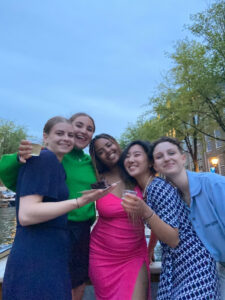
One thing that is significantly different between the host university and Stellenbosch is that all your exams are written in one week at the UVA. In Stellenbosch we are used to having exams spaced out over a few weeks. Bearing this in mind you should prepare accordingly and keep in mind that you might write 3 exams in 3 days and that can be quite a taxing experience. Furthermore, be aware you might have to wait a month to receive results back so be patient and try to enjoy the time as much as you can whilst waiting.
Also, don’t forget your study abroad submission deadlines. It may be very overwhelming dealing with new subjects and adjusting to moving to a new country but keep your short course in mind.
Finally, the Erasmus Student Network plans travel opportunities to different countries. I suggest you go because it is an affordable way to travel, and you can meet so many new people. I went to Prague, and it was the highlight of my exchange because I got to experience a new city, met new people and saw snow for the first time. Travel is really easy in the Netherlands so take any opportunity to also discover other parts of the country.
I missed home about 3 months in but regular phone calls with my family and friends helped me throughout this experience. So take your time, be curious and enjoy every minute of exchange.
Return to Stellenbosch:
Upon my return home there was a deep sense of familiarity which felt comforting after 6 months away from home. I was able to take in the beautiful landscape of my home city, enjoy the warmth, and enjoy all the delicious traditional dishes I love. It was also a relief to be in a space where I was not always the singular person of colour in a space and to feel like part of a group and not an outlier. However, the realities of safety issues and constant Eskom issues were difficult to deal with. This made me long for the ease of travel, safety and reliability of everything. However, being able to see loved ones again and feel part of my community was something that I deeply required to be happy.
My return to South Africa consisted of a lot of change, first a move from being on Stellenbosch University Campus to being back in Cape Town. Furthermore, I transitioned from being a student to a young professional. These transitions are significant and life-changing but I knew that I had succeeded in moving to another country on another continent. Furthermore, I was equipped with a new awareness of people, human interaction and how to navigate life’s uncertainties which made this transition somewhat easy.
Being overseas on my own forced me to become well acquainted with my own company and whilst at first, doing activities on my own proved uncomfortable I began to become more socially independent and assertive in doing what I enjoyed. This helped me be more independent as I entered the working world and made my navigation of that space much easier. Before living in Europe I assumed that it was a cornucopia of opportunities and just a perfect place overall but my experience showed me that with all the benefits of living in Europe, there are also drawbacks such as the cost of living. I think the experience of studying international law has also opened up my mind about the possibilities available after my degree and not just practising law in South Africa but also within the international legal system. Overall, the exchange experience was filled with many ups and downs but the biggest takeaway for me is my personal development and how I can use these newly developed personal skills in the new spaces which I now occupy upon my return. Anyone who was the opportunity to go on exchange should seize the opportunity.


